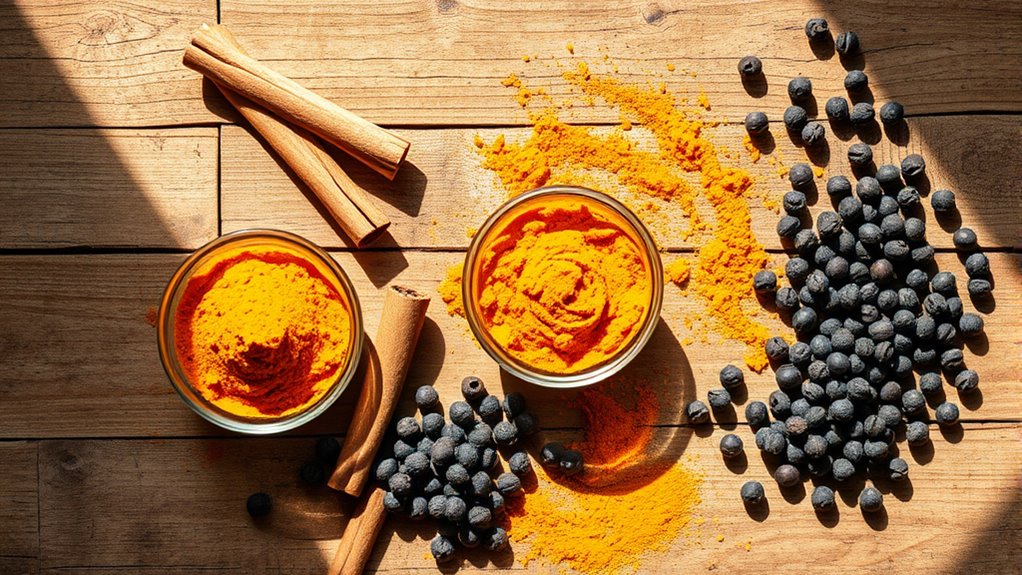Incorporating anti-inflammatory spices like turmeric, cinnamon, and beyond can boost your health naturally. Use light sautéing or simmering to maximize their benefits, or add powders to smoothies, oats, and dishes. Consider supplements for concentrated doses, but always choose quality and consult your healthcare provider. Pair spices with a balanced diet, exercise, and good sleep to get the best results. Keep exploring for simple, effective ways to reduce inflammation and support overall wellness.
Key Takeaways
- Turmeric and cinnamon are powerful anti-inflammatory spices that support overall health when incorporated into the diet.
- Light cooking methods, like sautéing turmeric with oil or simmering cinnamon, enhance their active compounds’ absorption.
- Herbal supplements of turmeric, ginger, and cinnamon offer concentrated doses for targeted inflammation reduction.
- Adding spices to daily meals—such as turmeric in rice or cinnamon on oatmeal—can help mitigate chronic inflammation over time.
- Combining anti-inflammatory spices with a balanced lifestyle, including diet, exercise, and stress management, maximizes health benefits.

Inflammation is a natural response by your body to injury or infection, but chronic inflammation can contribute to health problems like arthritis, heart disease, and more. To combat this, incorporating anti-inflammatory spices into your diet is a powerful and natural approach. You can start by exploring beneficial cooking methods that maximize the absorption of these spices’ active compounds. For example, lightly sautéing turmeric with a splash of oil enhances its curcumin bioavailability, making it more effective at reducing inflammation. Similarly, simmering cinnamon in teas or dishes helps release its anti-inflammatory properties without degrading its beneficial compounds. These simple cooking techniques guarantee you get the most out of your spices and support your overall health.
Beyond cooking, herbal supplement options present another effective way to incorporate these anti-inflammatory agents into your routine. Turmeric supplements, often standardized for curcumin content, provide a concentrated dose that can be easier to incorporate than regular turmeric powder, especially if you don’t enjoy its flavor. Ginger supplements also offer potent anti-inflammatory effects and are available in capsules or extracts, making it simple to add to your daily regimen. Cinnamon supplements, typically in capsule form, deliver its bioactive compounds efficiently, assuring you benefit from its anti-inflammatory potential without overdoing it in your food. When considering herbal supplements, always choose high-quality products from reputable sources and consult with a healthcare provider to verify safety and proper dosage.
Incorporating these spices into your diet and supplement routine isn’t just about flavor; it’s about leveraging their natural healing properties. You can add turmeric to smoothies, soups, or rice dishes, and sprinkle cinnamon on oatmeal, yogurt, or roasted vegetables. These small changes can make a noticeable difference in reducing inflammation over time. Additionally, combining herbal supplements with a balanced diet rich in fruits, vegetables, and healthy fats amplifies their effects. Remember, consistency is key. While these natural remedies can support your health, they work best as part of a broader lifestyle that includes regular exercise, stress management, and adequate sleep.
Frequently Asked Questions
Can Anti-Inflammatory Spices Replace Prescribed Medications?
You shouldn’t rely solely on anti-inflammatory spices to replace prescribed medications, especially if you have a spice allergy or are unsure about dosage guidelines. While spices like turmeric and cinnamon can support inflammation management, they aren’t substitutes for medical treatment. Always consult your doctor before making changes, and follow recommended dosages carefully to avoid adverse reactions. Spices can complement, but not replace, your prescribed medication plan.
Are There Any Side Effects From Consuming Excessive Spices?
Think of spice overdose as a gentle tide turning too strong, leading to adverse reactions. Yes, consuming excessive spices can cause side effects like stomach upset, allergic reactions, or bleeding issues. While spices are beneficial, too much can upset your balance. Keep your intake moderate to enjoy their health perks without risking adverse reactions. Moderation helps you savor their benefits safely and avoid unwanted spice overdose consequences.
How Should These Spices Be Stored for Maximum Potency?
To maximize potency, store your spices in airtight containers in a cool, dark place, away from heat and light. Proper storage techniques help preserve their freshness and active compounds. Avoid exposure to humidity, which can cause clumping or spoilage. Consider using glass jars with tight-fitting lids, and label them with purchase dates to monitor freshness. This way, you’ll enjoy the full anti-inflammatory benefits with every sprinkle.
Can Children Safely Consume Anti-Inflammatory Spices Regularly?
Think of giving spices to children as steering a delicate garden. While anti-inflammatory spices like turmeric and cinnamon are beneficial, you should prioritize child safety. Always consult a healthcare professional before introducing them regularly, and carefully consider spice dosage to avoid overdoing it. Keep portions small, monitor for adverse reactions, and make certain these spices complement a balanced diet. Proper guidance ensures your little one enjoys the benefits safely.
Do Spices Interact With Common Medications or Health Conditions?
You should be cautious about spice interactions with medications and health conditions. Many spices, like turmeric and cinnamon, can affect drug interactions by influencing blood sugar or blood clotting. If you have health conditions such as diabetes or blood pressure issues, talk to your healthcare provider before adding these spices regularly. They could alter how your medications work or worsen certain health issues, so professional guidance is essential.
Conclusion
Harnessing anti-inflammatory spices like turmeric and cinnamon is like adding a burst of sunshine to your daily routine, fighting pain and swelling from within. Imagine vibrant golden turmeric warming your plate while aromatic cinnamon whispers comfort in every sip. These spices transform simple meals into powerful health allies, turning everyday ingredients into nature’s medicine cabinet. Embrace their warmth and flavor, and let your body flourish with the gentle, fiery resistance against inflammation that these spices offer.









